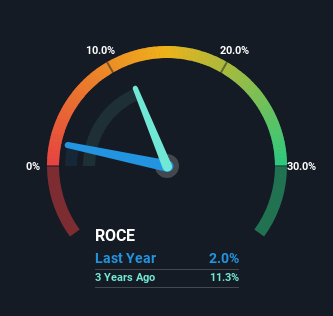- United Kingdom
- /
- Specialty Stores
- /
- AIM:G4M
Be Wary Of Gear4music (Holdings) (LON:G4M) And Its Returns On Capital
What are the early trends we should look for to identify a stock that could multiply in value over the long term? In a perfect world, we'd like to see a company investing more capital into its business and ideally the returns earned from that capital are also increasing. If you see this, it typically means it's a company with a great business model and plenty of profitable reinvestment opportunities. However, after investigating Gear4music (Holdings) (LON:G4M), we don't think it's current trends fit the mold of a multi-bagger.
Return On Capital Employed (ROCE): What Is It?
For those who don't know, ROCE is a measure of a company's yearly pre-tax profit (its return), relative to the capital employed in the business. Analysts use this formula to calculate it for Gear4music (Holdings):
Return on Capital Employed = Earnings Before Interest and Tax (EBIT) ÷ (Total Assets - Current Liabilities)
0.02 = UK£1.3m ÷ (UK£85m - UK£19m) (Based on the trailing twelve months to March 2023).
Thus, Gear4music (Holdings) has an ROCE of 2.0%. Ultimately, that's a low return and it under-performs the Specialty Retail industry average of 13%.
See our latest analysis for Gear4music (Holdings)

Above you can see how the current ROCE for Gear4music (Holdings) compares to its prior returns on capital, but there's only so much you can tell from the past. If you'd like to see what analysts are forecasting going forward, you should check out our free report for Gear4music (Holdings).
So How Is Gear4music (Holdings)'s ROCE Trending?
In terms of Gear4music (Holdings)'s historical ROCE movements, the trend isn't fantastic. Around five years ago the returns on capital were 7.8%, but since then they've fallen to 2.0%. However it looks like Gear4music (Holdings) might be reinvesting for long term growth because while capital employed has increased, the company's sales haven't changed much in the last 12 months. It's worth keeping an eye on the company's earnings from here on to see if these investments do end up contributing to the bottom line.
On a related note, Gear4music (Holdings) has decreased its current liabilities to 22% of total assets. That could partly explain why the ROCE has dropped. Effectively this means their suppliers or short-term creditors are funding less of the business, which reduces some elements of risk. Since the business is basically funding more of its operations with it's own money, you could argue this has made the business less efficient at generating ROCE.
The Bottom Line On Gear4music (Holdings)'s ROCE
Bringing it all together, while we're somewhat encouraged by Gear4music (Holdings)'s reinvestment in its own business, we're aware that returns are shrinking. It seems that investors have little hope of these trends getting any better and that may have partly contributed to the stock collapsing 79% in the last five years. In any case, the stock doesn't have these traits of a multi-bagger discussed above, so if that's what you're looking for, we think you'd have more luck elsewhere.
Since virtually every company faces some risks, it's worth knowing what they are, and we've spotted 2 warning signs for Gear4music (Holdings) (of which 1 is concerning!) that you should know about.
While Gear4music (Holdings) may not currently earn the highest returns, we've compiled a list of companies that currently earn more than 25% return on equity. Check out this free list here.
New: Manage All Your Stock Portfolios in One Place
We've created the ultimate portfolio companion for stock investors, and it's free.
• Connect an unlimited number of Portfolios and see your total in one currency
• Be alerted to new Warning Signs or Risks via email or mobile
• Track the Fair Value of your stocks
Have feedback on this article? Concerned about the content? Get in touch with us directly. Alternatively, email editorial-team (at) simplywallst.com.
This article by Simply Wall St is general in nature. We provide commentary based on historical data and analyst forecasts only using an unbiased methodology and our articles are not intended to be financial advice. It does not constitute a recommendation to buy or sell any stock, and does not take account of your objectives, or your financial situation. We aim to bring you long-term focused analysis driven by fundamental data. Note that our analysis may not factor in the latest price-sensitive company announcements or qualitative material. Simply Wall St has no position in any stocks mentioned.
About AIM:G4M
Gear4music (Holdings)
Engages in the retail of musical instruments, musician equipment, and audio-visual equipment in the United Kingdom, rest of Europe, and internationally.
Excellent balance sheet with proven track record.
Market Insights
Community Narratives



